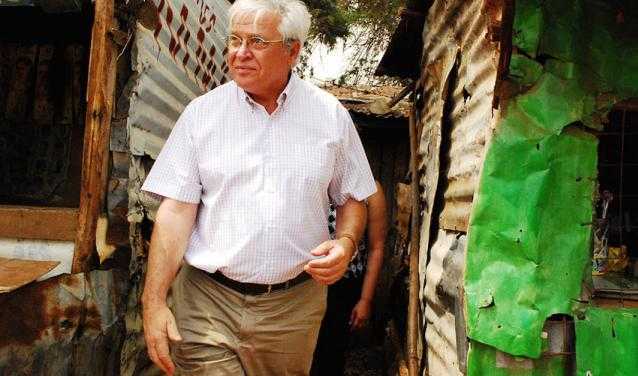Home>An urgent call for inclusive cities

01.09.2017
An urgent call for inclusive cities
On Friday 1 September, term starts at the Sciences Po Urban School. The inaugural lecture entitled “Urbanisation as a tool for development: the New Urban Agenda” will be given by Dr. Joan Clos, former mayor of Barcelona, Under-Secretary-General of the UN and Executive Director of the United Nations Human Settlements Programme (UN-HABITAT). In an interview with the Urban School, Dr. Clos reflects on the challenges currently posed by urbanisation and outlines the main recommendations of the New Urban Agenda to build inclusive, safe, resilient and sustainable cities.
The Quito Declaration of October 2016 specifies that the urban population is expected to double by 2050, making urbanisation one of the strongest trends of the twenty-first century. You recently said that: “we have lost science of building cities”. What are the consequences of this loss? And, in your view, what role does a research university have to play in improving the science of building cities?
As noted in the Quito Declaration, within the New Urban Agenda, urbanisation is one of the twenty-first century’s most transformative trends. However, global debate over the negative trends of current urbanisation worldwide has been poor. As part of the contribution towards the New Urban Agenda, recent analysis revealed that current urban practices are unsustainable, even as urbanisation remains the main driver of economic development. There is a decrease in planning, leading to spontaneous urbanisation – and growth in urban poverty – diminishing densities, increased urban expansion, less public space and more energy consumption.
There has also been a lack of attention paid to the benefits that can be generated from good urbanisation. The New Urban Agenda presents a paradigm shift based on the science of cities. Research and analysis in urbanisation can drive wealth, prosperity and human progress for present and future urban dwellers, particularly in developing countries where major urban transformations will inevitably take place.
The New Urban Agenda resulting from the Quito conference aims to focus on goal 11 of the 17 sustainable development objectives, which is to “make cities inclusive, safe, resilient and sustainable". What concrete measures can be put in place? What are the most challenging political conflicts around these goals?
The New Urban Agenda presents five main pillars for implementation: national urban policies, rules and regulations, urban planning and design, financing and, of course, local implementation. To put these strategies into practice requires both political and managerial compromises by all stakeholders.
On one side, the capacity of subnational and local governments must be strengthened. On the other, many central governments do not recognise the responsibility they have in ensuring good quality urbanisation. The New Urban Agenda is an urgent call for national governments to accept their responsibility in the urbanisation process, particularly by establishing national urban policies.
The New Urban Agenda recognises a "right to the City" for all citizens. Why is this right so important? What are its main implications?
The New Urban Agenda is a shared vision of cities for all. It resolves to ”leave no one behind”, referring to the equal use and enjoyment of cities, seeking to promote inclusivity and ensure that all inhabitants are able to produce just, safe, healthy, accessible, affordable, resilient places to foster prosperity and quality of life for all.
Urbanisation is a social endeavour. It means that urbanisation is not just for the people (as the mantra states), but also done by the people. Planning and designing proper public space is a way of guaranteeing rights in the city, as well as affordable housing, access to mobility and sustainable production.
What are UN Habitat’s main recommendations for implementing sustainable policies in politically and administratively fragmented metropolitan areas? How can you deal with territories which do not want to cooperate?
Now more than ever, metropolitan areas play a key role in nations’ development, due to their concentration of population and activities.
Metropolitan cooperation may help address issues extending beyond local boundaries in several strategic areas, with a view to ensuring the competitiveness, attractiveness and social inclusion and cohesion of the entire metropolitan area, in keeping with sustainable development principles.
Metropolitan governance requires a clear legal and institutional framework, a strong financial plan and responsibility to foster good urban planning and design. Our cities are expanding fast, so it is better to start innovating in terms of supra-local governance as soon as possible.
Dr Joan Clos is United Nations Under-Secretary-General and Executive Director of UN-Habitat. Born in Barcelona, Joan Clos is a medical doctor with a distinguished career in public service and diplomacy. He was twice elected Mayor of Barcelona between 1997 and 2006. He was also the Minister of Industry, Tourism and Trade of Spain from 2006 to 2008. Prior to joining the United Nations in 2010, he served as Spanish ambassador to Turkey and Azerbaijan. He was appointed Secretary-General of the UN Conference on Housing and Sustainable Urban Development, Habitat III.
UN-Habitat was mandated by the UN General Assembly in 1978 to address the issues of urban growth, and works towards a better urban future. Its mission is to promote socially and environmentally sustainable human settlements and achieve adequate shelter for all. UN-Habitat is capitalising on its experience and position to work with partners in order to formulate the urban vision of tomorrow. It works to ensure that cities become inclusive and affordable drivers of economic growth and social development. www.unhabitat.org
Find out more